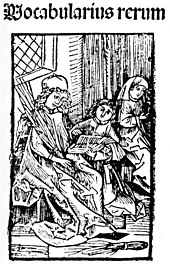A teacher who facilitates education for an individual may also be described as a personal
tutor, or, largely historically, a
governess.
In some countries, formal education can take place through
home schooling.
Informal learning may be assisted by a teacher occupying a transient or ongoing role, such as a family member, or by anyone with knowledge or skills in the wider community setting.
Professional educators

A teacher of a Latin school and two students, 1487
A teacher's professional duties may extend beyond formal teaching. Outside of the classroom teachers may accompany students on field trips, supervise
study halls, help with the organization of school functions, and serve as supervisors for
extracurricular activities. In some education systems, teachers may have responsibility for student
discipline.
There are a variety of bodies designed to instill, preserve and update the knowledge and professional standing of teachers. Around the world many governments operate teacher's colleges, which are generally established to serve and protect the public interest through
certifying, governing and enforcing the standards of practice for the teaching profession.
The functions of the teacher's colleges may include setting out clear standards of practice, providing for the ongoing education of teachers, investigating complaints involving members, conducting hearings into
allegations of professional misconduct and taking appropriate disciplinary action and
accrediting teacher education programs. In many situations teachers in
publicly funded schools must be members in good standing with the college, and
private schools may also require their teachers to be college peoples. In other areas these roles may belong to the State
Board of Education, the
Superintendent of Public Instruction, the
State Education Agency or other governmental bodies. In still other areas
Teaching Unions may be responsible for some or all of these duties.
Pedagogy and teaching

Dutch schoolmaster and children, 1662

A primary school teacher in northern
Laos

The teacher-student-monument in
Rostock, Germany, honours teachers
In
education, teachers facilitate
student learning, often in a
school or academy or perhaps in another environment such as
outdoors. A teacher who teaches on an individual basis may be described as a
tutor.

GDR "village teacher", a teacher teaching students of all age groups in one class in 1951

Jewish children with their teacher in
Samarkand, the beginning of the 20th century.
The objective is typically accomplished through either an
informal or formal approach to learning, including a course of study and
lesson plan that teaches
skills,
knowledge and/or
thinking skills. Different ways to teach are often referred to as
pedagogy. When deciding what teaching method to use teachers consider students' background knowledge, environment, and their learning goals as well as standardized
curricula as determined by the relevant authority. Many times, teachers assist in learning outside of the classroom by accompanying students on field trips. The increasing use of
technology, specifically the rise of the
internet over the past decade, has begun to shape the way teachers approach their roles in the
classroom.
The
objective is typically a course of study,
lesson plan, or a practical skill. A teacher may follow standardized
curricula as determined by the relevant authority. The teacher may interact with students of different ages, from infants to
adults, students with different abilities and students with learning
disabilities.





